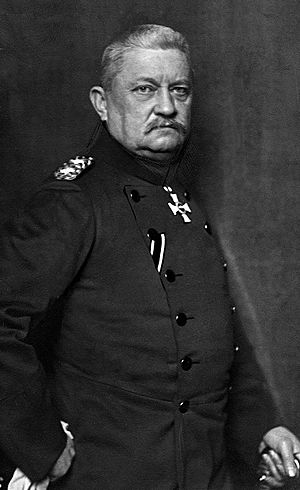Karl von Bülow facts for kids
Quick facts for kids
Karl von Bülow
|
|
|---|---|

Karl von Bülow, 1915.
|
|
| Born | 24 March 1846 Berlin, Kingdom of Prussia, German Confederation |
| Died | 31 August 1921 (aged 75) Berlin, Free State of Prussia, Weimar Republic |
| Buried |
Invalidenfriedhof Berlin
|
| Allegiance | |
| Service/ |
|
| Years of service | 1866–1916 |
| Rank | Generalfeldmarshall |
| Commands held | 2nd Army |
| Battles/wars | Austro-Prussian War Franco-Prussian War World War I |
| Awards | Pour le Mérite Knight Grand Cross of the Royal Victorian Order (United Kingdom) |
Karl Wilhelm Paul von Bülow was a German military leader. He became a field marshal, which is a very high rank in the army. He commanded the German 2nd Army during World War I from 1914 to 1915. He was born in Berlin on March 24, 1846, and passed away on August 31, 1921.
Contents
Early Military Career
Karl von Bülow was born in Berlin in 1846. His family, the von Bülows, had a long history of serving in the Prussian military. He joined the Prussian Army in 1864.
First Battles and Promotions
Von Bülow fought in the Austro-Prussian War in 1866. He showed great skill at the Battle of Königgrätz. Later, he was a junior officer in the Franco-Prussian War of 1870. For his bravery, he received the Iron Cross Second Class.
By 1877, von Bülow was a Captain in the German General Staff. He continued to rise through the ranks. In 1894, he became a Colonel. Three years later, in 1897, he was a major-general. He also became the director of an important department in the German War Ministry. By 1901, he was a lieutenant-general. He then commanded the Guards Division. From 1903, he led the German III Corps. In 1912, he became an inspector for the German 3rd Army.
World War I Role
When World War I began in August 1914, Karl von Bülow was put in charge of the German 2nd Army. His army was part of the German forces that invaded Belgium.
Battles in Belgium and France
Von Bülow's army quickly took control of Liège on August 7. They also captured the fortress of Namur on August 22–23. Moving into France, von Bülow's forces defeated General Charles Lanrezac's French Fifth Army. These victories happened at Charleroi on August 23–24 and again at Saint-Quentin on August 29–30.
The Marne and Retreat
As the 2nd Army and General Alexander von Kluck's 1st Army moved closer to Paris in late August and early September, von Bülow became worried. There was a growing gap between the two armies. He ordered Kluck to move his 1st Army closer to him. This decision changed the original plan, known as the Schlieffen Plan. Instead of moving southwest of Paris, Kluck's army advanced southeast.
Von Bülow's army crossed the Marne on September 4. However, combined French and British forces launched a strong counterattack. This was the First Battle of the Marne, from September 5–10. Because of this, von Bülow was ordered to retreat to the Aisne. Many people in Germany believed that von Bülow was responsible for the German army not capturing Paris.
Later Life and Retirement
In January 1915, von Bülow was promoted to Field Marshal. This is the highest rank in the army. Two months later, he suffered a heart attack. On April 5, 1915, he received the Pour le Mérite, a very high military honor. He was allowed to retire from the army in early 1916. He lived in Berlin until his death in 1921.
Awards and Honors
Karl von Bülow received many awards for his long military service. Some of his most notable honors include:
- Iron Cross of 1870, 2nd class (Prussia)
- Order of the Black Eagle with Chain (Prussia)
- Grand Cross of the Military Merit Order (Bavaria)
- Knight Grand Cross of the Royal Victorian Order (United Kingdom)
- Pour le Mérite (April 4, 1915)
- Grand Commander of the Royal House Order of Hohenzollern with Swords (June 22, 1916)
See also
 In Spanish: Karl von Bülow para niños
In Spanish: Karl von Bülow para niños
 | Mary Eliza Mahoney |
 | Susie King Taylor |
 | Ida Gray |
 | Eliza Ann Grier |

